BMW XM vs Ford Transit Transporter – Differences & prices compared
Compare performance, boot space, consumption and price in one view.
Find out now: which car is the better choice for you – BMW XM or Ford Transit Transporter?
The BMW XM (SUV) comes with a Plugin Hybrid engine and Automatic transmission. In comparison, the Ford Transit Transporter (Cargo Van) features a Diesel or Electric engine with Manuel or Automatic transmission.
When it comes to boot capacity, the BMW XM offers 527 L, while the Ford Transit Transporter provides – depending on how much space you need. If you’re looking for more power, decide whether the 748 HP of the BMW XM or the 269 HP of the Ford Transit Transporter suits your needs better.
In terms of consumption, the values are 1.40 L per 100 km for the BMW XM, and 21.30 kWh7.90 L for the Ford Transit Transporter.
Price-wise, the BMW XM starts at 114700 £, while the Ford Transit Transporter is available from 39900 £. Compare all the details and find out which model fits your lifestyle best!
BMW XM
The BMW XM represents a bold foray into the high-performance luxury SUV market with its striking design and powerful hybrid drive. This model melds cutting-edge technology with opulence, offering an unparalleled driving experience. Its interior is meticulously crafted, providing both driver and passengers with supreme comfort and innovative connectivity features.
details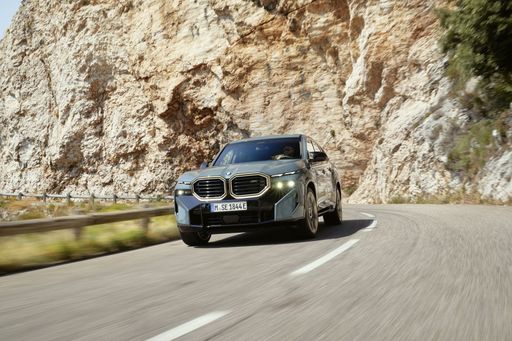 @ press.bmwgroup.com
@ press.bmwgroup.com
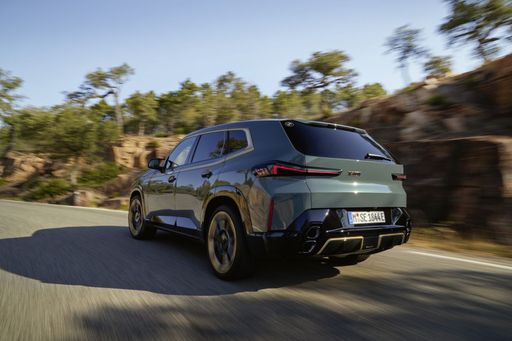 @ press.bmwgroup.com
@ press.bmwgroup.com
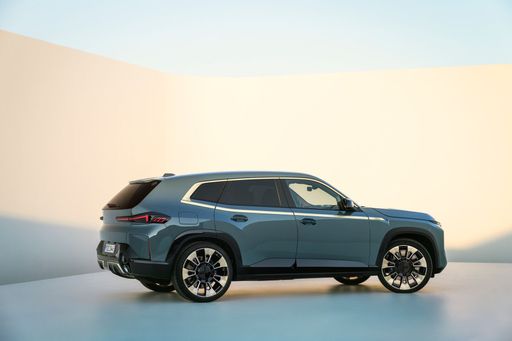 @ press.bmwgroup.com
@ press.bmwgroup.com
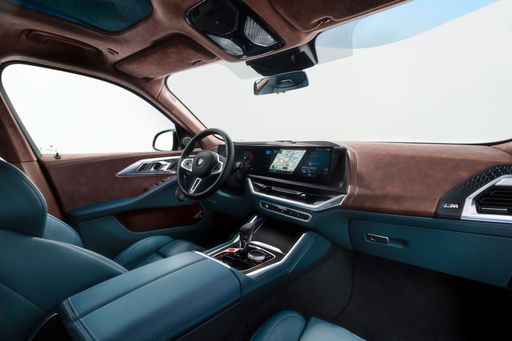 @ press.bmwgroup.com
@ press.bmwgroup.com
Ford Transit Transporter
The Ford Transit Transporter has long been a staple in the commercial vehicle sector, renowned for its reliability and versatility. It offers a comfortable cabin with a modern design that enhances the driving experience, making long journeys more enjoyable. With a focus on practicality, the Transit provides ample cargo space, meeting the demands of businesses and individual users alike.
details @ media.ford.com
@ media.ford.com
 @ media.ford.com
@ media.ford.com
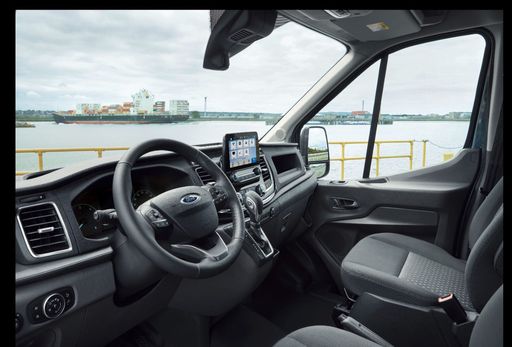 @ media.ford.com
@ media.ford.com

|

|
|
|
|
Costs and Consumption |
|
|---|---|
|
Price
114700 - 157200 £
|
Price
39900 - 69100 £
|
|
Consumption L/100km
1.4 - 2 L
|
Consumption L/100km
7.9 - 10.3 L
|
|
Consumption kWh/100km
-
|
Consumption kWh/100km
21.3 - 32 kWh
|
|
Electric Range
82 - 85 km
|
Electric Range
247 - 317 km
|
|
Battery Capacity
25.70 kWh
|
Battery Capacity
68 kWh
|
|
co2
31 - 44 g/km
|
co2
0 - 270 g/km
|
|
Fuel tank capacity
69 L
|
Fuel tank capacity
70 L
|
Dimensions and Body |
|
|---|---|
|
Body Type
SUV
|
Body Type
Cargo Van
|
|
Seats
7
|
Seats
3 - 6
|
|
Doors
5
|
Doors
4
|
|
Curb weight
2695 - 2795 kg
|
Curb weight
2074 - 2765 kg
|
|
Trunk capacity
527 L
|
Trunk capacity
-
|
|
Length
5110 mm
|
Length
5531 - 6704 mm
|
|
Width
2005 mm
|
Width
2059 mm
|
|
Height
1755 mm
|
Height
2530 - 2778 mm
|
|
Payload
505 - 525 kg
|
Payload
735 - 2607 kg
|
Engine and Performance |
|
|---|---|
|
Engine Type
Plugin Hybrid
|
Engine Type
Diesel, Electric
|
|
Transmission
Automatic
|
Transmission
Manuel, Automatic
|
|
Transmission Detail
Automatic Gearbox
|
Transmission Detail
Manual Gearbox, Automatic Gearbox
|
|
Drive Type
All-Wheel Drive
|
Drive Type
Front-Wheel Drive, Rear-Wheel Drive, All-Wheel Drive
|
|
Power HP
476 - 748 HP
|
Power HP
105 - 269 HP
|
|
Acceleration 0-100km/h
3.8 - 5.1 s
|
Acceleration 0-100km/h
-
|
|
Max Speed
250 km/h
|
Max Speed
120 km/h
|
|
Torque
700 - 1000 Nm
|
Torque
310 - 430 Nm
|
|
Number of Cylinders
6 - 8
|
Number of Cylinders
4
|
|
Power kW
350 - 550 kW
|
Power kW
77 - 198 kW
|
|
Engine capacity
2998 - 4395 cm3
|
Engine capacity
1995 cm3
|
General |
|
|---|---|
|
Model Year
2025
|
Model Year
2019 - 2024
|
|
CO2 Efficiency Class
B
|
CO2 Efficiency Class
G, A
|
|
Brand
BMW
|
Brand
Ford
|
BMW XM
The New BMW XM: A Fusion of Power and Innovation
BMW has long been synonymous with both luxury and performance, and the new BMW XM range takes these attributes to new heights. Blending groundbreaking hybrid technology with BMW's signature design ethos, the XM lineup pushes the boundaries of what an SUV can be. Below, we will delve into the key technical specifications and innovative features that make the BMW XM stand out in a crowded market.
Performance and Power Unleashed
At the heart of the BMW XM lies a fusion of combustion and electric technology. The robust Plug-In Hybrid system ensures that drivers experience both exhilarating power and efficient performance. Available in various configurations, BMW XM models range from 476 to an astounding 748 PS, translating to a powerful acceleration of 0-100 km/h in just 3.8 to 5.1 seconds.
The XM models harness this power through a sophisticated All-Wheel Drive system complemented by an automatic Steptronic Sport transmission. This ensures smooth transitions through the gears, optimizing performance and providing a thrilling driving experience.
Efficiency Meets Excellence
Despite its formidable performance capabilities, the BMW XM stands out in terms of fuel efficiency. The Plug-In Hybrid technology allows for a fuel consumption of just 1.6 to 1.9 L/100km, with an electric range of up to 79 km on a single charge. Complemented by a 25.7 kWh battery, drivers benefit from reduced emissions, boasting a CO2 output of 37 to 42 g/km.
This remarkable efficiency allows the BMW XM to command an impressive balance between dynamic driving and environmental responsibility, earning it a CO2 efficiency rating of class B.
Design and Dimensions: A True Statement
BMW's XM models showcase a commanding presence on the road. With dimensions of 5110 mm in length, 2005 mm in width, and 1755 mm in height, the vehicle embodies the quintessential SUV silhouette—bold yet refined.
Signature design elements and luxurious touches are found throughout, from the intricate details of its aerodynamic body to the premium materials and advanced technologies inside. The model offers ample space, accommodating up to seven passengers, thanks both to its spacious interior and generous boot capacity of 527 litres.
Innovative Features: Comfort and Connectivity
Beyond its performance metrics, the BMW XM range is also a showcase of innovative features designed to enhance the driving experience. A suite of connected technologies ensures that safety, entertainment, and comfort are never compromised. Intelligently integrated infotainment systems and driver-assistance features place the BMW XM at the forefront of modern automotive technology.
Moreover, the attention to detail in comfort settings, including adaptive seating configurations and climate controls, ensures passengers have a luxurious and serene journey, no matter the distance.
Conclusion: The Pinnacle of Modern SUV Design
The BMW XM range is a testament to the brand's commitment to innovation, luxury, and performance. With technology designed to meet the demands of future motoring, it stands as a flagship model in BMW's SUV lineup. Whether you are drawn to its cutting-edge hybrid technology, awe-inspiring performance, or luxurious design, the BMW XM has set a new standard within the automotive industry.
Ford Transit Transporter
Discovering the Ford Transit Transporter: A Blend of Tradition and Innovation
The Ford Transit Transporter has long been a staple in the commercial vehicle market, known for its reliability and versatility. As Ford continues its innovative journey, the Transit Transporter integrates modern technology and eco-friendly advancements, making it more appealing than ever. Here, we explore some of its key technical details and innovations.
Under the Bonnet: Engine Variants and Efficiency
The Ford Transit Transporter offers a variety of engine options to cater to diverse commercial needs. Among these, the 2.0 EcoBlue Diesel engine provides a robust selection of power outputs, ranging from 105 to 165 PS. Not just limited to traditional fuel, Ford also introduces the E-Transit line with electric motors generating up to 269 PS. This transition to electric is an essential step towards sustainability, achieving an impressive range of 247 to 317 km on a full charge.
Fuel Economy and Environmental Impact
When it comes to fuel efficiency, the Transit Transporter presents a competitive edge with diesel variants consuming between 7.9 to 10.3 L/100km. On the electric side, consumption levels are measured at 21.3 to 32 kWh/100km. Furthermore, the Transit’s CO2 emissions range from zero for electric models to 270 g/km for select diesel engines, placing the vehicle in varying CO2 efficiency classes from G to A.
Performance and Driving Dynamics
Designed for optimal performance, the vehicle’s torque output ranges from 310 to 430 Nm, facilitating smooth and powerful driving experiences across various terrains. The Transit Transporter boasts a maximum speed of 120 km/h, ensuring timely commutes and deliveries, crucial for business efficacy.
The Versatility of Drivetrain Options
The Ford Transit Transporter provides an array of drivetrain configurations, including front-wheel, rear-wheel and all-wheel drive. This adaptability enables the vehicle to tackle different driving conditions with ease, offering stability and resilience no matter the challenge.
Technology and Innovation on Board
Ford’s commitment to innovation is evident within the Transit Transporter’s interior. Intuitive features such as advanced driver-assistance systems, smart connectivity tools, and ergonomic seating arrangements ensure that both driver and passengers enjoy a seamless and comfortable journey, ideal for long rides or daily routines.
Crafted for Practicality and Comfort
With length variations extending from 5531 mm to 6704 mm, and height options from 2530 mm to 2778 mm, the Ford Transit Transporter offers expansive cargo space and flexible seating arrangements. Depending on the variant, seating options range from 3 to 6 seats, catering to diverse passenger and cargo needs.
A Future-Ready, Cost-Effective Choice
Price tags for the Ford Transit Transporter range from €46,589 to €80,611, accommodating different budget requirements. With monthly operation costs calculated between €1430 and €1991, the Transit remains a financially viable option for businesses seeking reliability and efficiency.
Conclusion: An Unyielding Commitment to Excellence
The Ford Transit Transporter stands as a testament to Ford’s dedication to marrying tradition with progress. With its diverse range of powertrains, technological integrations, and practical design, it continues to lead the commercial vehicle segment, ready to meet the challenges of modern mobility and sustainability.
The prices and data displayed are estimates based on German list prices and may vary by country. This information is not legally binding.
